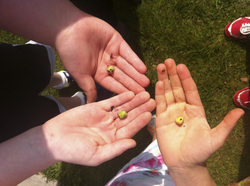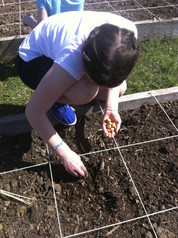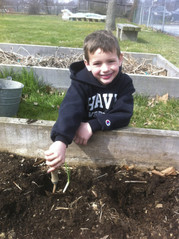
Profiles in Green: Allison Karpyn “Growing Good Eaters”
Growing A Garden AND Good Eaters
With spring in the air, many people are starting to think about their gardens. I, for one, have begun replacing dead branches and leaves with new soil and seeds in hopes that the warm weather will bring some early spring greens my way. My kids love the garden. My 3-year-old takes great joy in planting the seeds and watching them grow and my 8-year-old has taken to cultivating a plot of her own. The reality, though, is that many children don’t have the chance to experience how a vegetable emerges from a seed and are unfamiliar with the bounty that comes from dirty hands. I know this fact firsthand from my work studying the impacts of nutrition education and policy initiatives at The Food Trust.
Based in Philadelphia, the agency works to bring gardens to schools and educate the next generation about the food system. Gardens are one piece of the puzzle to encourage children to love wholesome food. Those of us who work in gardens have become believers in the power they have to change perspectives on food. And I didn’t just make that all that up – research to date supports gardens as effective nutrition education.
Growing A Garden AND Good Eaters
With spring in the air, many people are starting to think about their gardens. I, for one, have begun replacing dead branches and leaves with new soil and seeds in hopes that the warm weather will bring some early spring greens my way. My kids love the garden. My 3-year-old takes great joy in planting the seeds and watching them grow and my 8-year-old has taken to cultivating a plot of her own. The reality, though, is that many children don’t have the chance to experience how a vegetable emerges from a seed and are unfamiliar with the bounty that comes from dirty hands. I know this fact firsthand from my work studying the impacts of nutrition education and policy initiatives at The Food Trust.
Based in Philadelphia, the agency works to bring gardens to schools and educate the next generation about the food system. Gardens are one piece of the puzzle to encourage children to love wholesome food. Those of us who work in gardens have become believers in the power they have to change perspectives on food. And I didn’t just make that all that up – research to date supports gardens as effective nutrition education.

A recent study published in the former Journal of the American Dietetic Association (now called the Academy of Nutrition and Dietetics) found evidence for the effectiveness of garden-based nutrition education to be “promising” and identified these programs as having the potential to lead to improvements in fruit and vegetable intake, willingness to taste fruits and vegetables, and increased preferences among youth to eat produce.
The issue is particularly relevant since most of us, including children, eat too few fruits and vegetables. Right now, less than half of boys and girls eat 5 servings of fruits and vegetables daily. Obesity rates are staggering – costing Americans $147 billion in 2009 alone. Worse, though, is the burden of disease on families and their children. If current trends continue, 1 in 3 Americans is expected to have diabetes by 2050.
The issue is particularly relevant since most of us, including children, eat too few fruits and vegetables. Right now, less than half of boys and girls eat 5 servings of fruits and vegetables daily. Obesity rates are staggering – costing Americans $147 billion in 2009 alone. Worse, though, is the burden of disease on families and their children. If current trends continue, 1 in 3 Americans is expected to have diabetes by 2050.

Current nutrition education efforts have demonstrated some effectiveness. More often than not, fruit consumption increases beyond vegetable consumption (which isn’t all bad of course). The reality is that fruits have the benefit of sweet taste while many vegetables tap into our bitter buds – a taste profile kids don’t embrace. Research suggests that gardens may help buck this trend.
So this spring go ahead and invite some children into your garden, and if you can, offer to help your local school maintain their garden over the summer. Dirty hands can change the world!
Allison Karpyn is the Director of Research & Evaluation at The Food Trust, a non-profit based in Philadelphia that works to provide access to affordable nutritious food to all residents. Allison has a Ph.D. from the University of Pennsylvania and lives in Wallingford with her husband and two daughters.
So this spring go ahead and invite some children into your garden, and if you can, offer to help your local school maintain their garden over the summer. Dirty hands can change the world!
Allison Karpyn is the Director of Research & Evaluation at The Food Trust, a non-profit based in Philadelphia that works to provide access to affordable nutritious food to all residents. Allison has a Ph.D. from the University of Pennsylvania and lives in Wallingford with her husband and two daughters.

 RSS Feed
RSS Feed